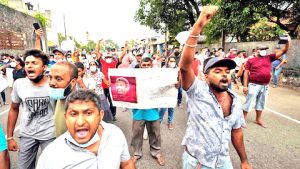
April 3, Colombo, Sri Lanka: protestors block highway
Growing Unrest Spreads Worldwide
CHENNAI (India), June 19— “What would happen if we had thousands of ICWP members in Sri Lanka?” asked a comrade who works at an auto factory here. Everyone in our makeshift office responded: about fifty friends and supporters. Almost half had lost jobs. They worked in the auto industry, which is crippled because of high gasoline prices and inflation.
The violent May 9th uprising in Sri Lanka created the possibility of mass unrest worldwide. Conditions in Sri Lanka are no different than in the rest of the world. Mounting unemployment and the increasing cost of living make survival very difficult.
The Ukraine war is adding to the misery of the working class. Sweden, which is applying to join NATO, has a higher unemployment rate than Rwanda. On every continent, youth especially are unemployed in large numbers.
The bosses’ response to this crisis is to promote communal violence, xenophobia, and rampant sexism and racism. Sri Lanka bosses built poisonous violence to attack Muslim and other minority workers in their desperate attempt to divide the workers.
However, for eight months, unemployed young people demanded jobs, food, and fuel. ,They rejected all the political parties. The fury of the youth spilled into the streets. Every town and city saw massive crowds attacking and burning government politicians’ homes.
The masses lacked one key ingredient: the revolutionary communist party ICWP that would turn rebellion into a communist revolution to seize power from the bosses and end wage slavery.
“When I worked in a Ford auto factory, my wages were good,” said a comrade. “I thought I could buy a small house to move out of the slum. After working for sixteen years, I still live in the slum and now I am without work, supporting four family members.
“I think what happened in Sri Lanka is going to happen here. I have come to believe that we live in a system that is working against our interests. I used to get very depressed not having a job. But after I read Red Flag, I spend at least an hour every day going to my neighbors and talking about how communism will change our society. I distribute Red Flag to many people.”
“But how long will it take to destroy capitalism?” asked a youth who has tried to get a job for the last five years. “I am fed up with the system. I get very angry. But I don’t see that we will have communism in my lifetime. I want to see change now.”
“The bosses spread their lies that their system will survive forever,” an ICWP organizer responded. “But their system is extremely weak. They survive only because the working class is weak and divided. They hope that workers can be bribed by wage slavery. But we can show workers that capitalism has no future. It only perpetuates wage slavery. Communism is the only way to break wage slavery.”
The debates and discussions continued for over three hours.
A comrade concluded, “We have seven billion workers in the world. We can win most of them because everyone is a wage slave and only communism can break wage slavery. But to organize seven billion people, we must build long term relationships of trust and confidence among people we know and struggle with.
“We organize a small group of ICWP comrades who will eventually organize masses to confront the bosses in the class struggle. The events in Sri Lanka are of vital importance to us. Small groups of ICWP members in thousands can lead to communist insurrection. That will inspire the working class everywhere, opening a door to worldwide communist revolution.”
Comrades here are very inspired by the comrades in South Africa who are spreading Red Flag and recruiting new comrades. We need to recruit more members to our party.
We aim to double our distribution in working-class areas of Chennai from 1000 to 2000 Red Flags next issue. We have around fifty comrades here. If we each struggle to build close communist relationships with consistency and patience, we aim to reach at least 500 close friends.
A recent visit by comrades from Bengaluru and elsewhere has added to the urgency of our work. We are more committed to working with our collective regularly and we have formed study groups to apply dialectics to our daily life. We now distribute about 100 Red Flags in Sri Lanka and hope to visit readers there shortly.

